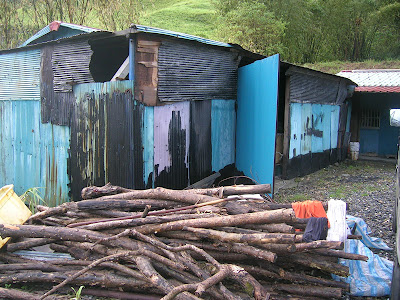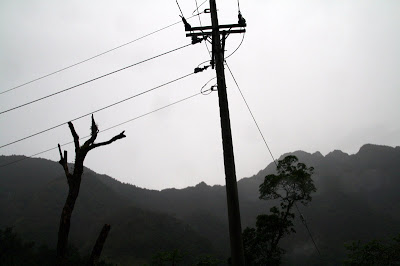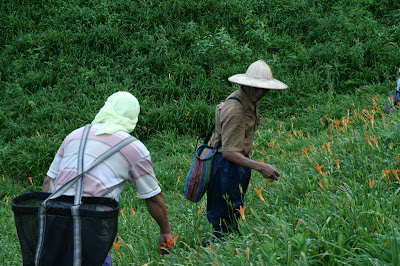Its hard to imagine that in high-tech Taiwan – one of the most wired societies in the world – there can be any community without access to electricity. But there is: a settlement of aboriginals from the Amis tribe – one of the island’s 13 officially recognized tribes - living in Hualien county on Taiwan’s east coast. Its not connected to the electricity grid and has no access to power. Its known locally as as The Dark Village.
 Amis villagers celebrate at a day lily festival.
Amis villagers celebrate at a day lily festival.
Legal disputes over the land are the main reason the site never got connected to the mains grid. Decades ago, the land was seized by the government and developed for forestry. But today, the local people – members of the Amis aboriginal tribe; one of Taiwan’s 13 officially recognized tribes – are trying to reassert their ancestral land claims.



 Day lily fried chips
Day lily fried chips  Day lily icecream
Day lily icecream"Organic farming can earn us more money; and it’s a healthier product for customers to eat", he says. "My children picked day lilies when they were young..but for them it was difficult work. When they finished school, they chose to work in the city.
 Will they still live in the village when they are older?
Will they still live in the village when they are older?
houses at the Dark Village - pic courtesy of World Vision Taiwan
 Cooking at night by fire in the village
Cooking at night by fire in the village"Having no electricity..its like being blind" , says 63 year old Kiko. She tells me its hard to keep food fresh- especially meat. I ask her what's the first thing she would buy if they had electricity in the village. " A refrigerator..a washing machine..a tv..a cell phone. lots of things", she says, barely pausing for breath.
 These day lilies have bloomed..and cannot be eaten
These day lilies have bloomed..and cannot be eaten  Electricity poles appeared near the settlement a few months ago.
Electricity poles appeared near the settlement a few months ago."I really really want power in the village", he tells me "because I've been living there forever. I want to enjoy some modern life..put something in the refrigerator; I don't want to heat up wood to burn things, to cook. I've been waiting for it all my life.", he says.

You might think the whole tribe would welcome the arrival of electricity - but that's not the case.

"We don’t have electricity, so people get together after work; chat, and talk about important things. In the past, we would tell stories and sing too. If we had electricity, we’d all just sit around watching TV and wouldn’t talk about things", he says.
Okoc, a mother of four, agrees. "We don’t want regular electriricty. I like things the way they are.

The debate is creating such damaging divisions within the tribe that younger members say they will respect the wishes of the elders. But one compromise solution could be solar power - which would be more in keeping with the tribe’s goals of developing future projects like ecotourism and trekking.

1 comment:
Caro: this was a great tour. I am an avid organic gardener and daylily grower. You've given me some ideas. And I definitely respect the villagers for their industriousness and willingness to at least discuss forgoing the hypotism of "the Tube".
Post a Comment